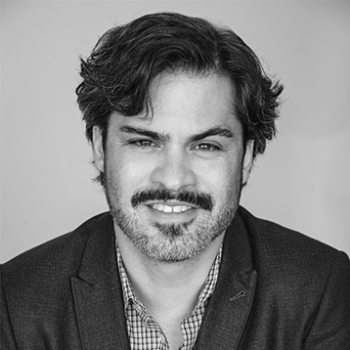Ricardo Nuila is the Next Speaker in the Mudd Lecture Series Nuila, associate professor of medicine, medical ethics and health policy at Baylor College of Medicine, will give a lecture on Oct. 22 at 5 p.m. in Northen Auditorium.

Ricardo Nuila, associate professor of medicine, medical ethics and health policy at Baylor College of Medicine, will present a lecture on Oct. 22 at 5 p.m. in Northen Auditorium in Leyburn Library as part of W&L’s Mudd Center for Ethics’ series on “How We Live & Die.”
Nuila’s lecture, which is free and open to the public, is titled “The People’s Hospital: Hope and Peril in American Medicine.” The event will also be streamed online at https://go.wlu.edu/livestream.
In addition to his faculty position at Baylor, Nuila directs the Humanities Expression and Arts Lab (HEAL) program, which integrates the arts and humanities into medical education. He also works as an internal medicine doctor and hospitalist at Ben Taub Hospital in Houston, a “safety-net” hospital that treats any patient who walks in the hospital’s doors regardless of their insurance status.
“We are eagerly awaiting Dr. Nuila’s visit, as his work embodies many aspects of this year’s theme,” said Melissa Kerin, the director of the Mudd Center. “Nuila’s talk will touch on the ethics, but also the economics, of healthcare in the U.S. He will raise difficult questions about what happens to those who are not insured but who are in need of healthcare, and where the responsibility lies to help these groups of people.”
As both a writer and a doctor, Nuila’s work focuses on health disparities, the impact of policies on real people and the intersection of art and medicine. He recently authored a book, titled “The People’s Hospital,” which follows five uninsured patients he has treated at Ben Taub and chronicles their experiences with the American healthcare system. In his Oct. 22 lecture, Nuila will draw on the themes explored in his book and how he works to ensure his patients receive quality and empathetic care.
“While he will delve into the complex business of hospitals and the messy worlds of health insurance, Nuila also brings in another facet of this year’s program: the power of storytelling,” Kerin said. “Over the years, the fields of narrative ethics and medical humanities have demonstrated that stories and story-sharing are generative and relational practices that may serve as sources of resilience and wellbeing for patient, provider and the surrounding community.”
The narrative emphasis of this year’s “How We Live & Die” series is linked to the ethical premise of testimonial justice, an idea rooted in the work of philosopher Miranda Fricker (who delivered a Mudd Center series lecture in 2017) on the concept of testimonial injustice, which relates to her larger thesis on epistemic injustice.
“Fricker asks us to consider not only whose stories are told but whose voices are listened to and by whom when generating and shaping bodies of knowledge and understanding,” Kerin said. “Nuila’s book highlights stories of individuals who are at the margins of our society, whose voices are not generally listened to. He brings attention to them, and in doing so deepens our understanding of medicine, but also provides a counter to epistemic injustice.”
Nuila received his bachelor’s degree from Georgetown University and his M.D. from Baylor College of Medicine. His work and research on the use of arts and humanities in medical practice have been supported by the Association of American Medical Colleges and he has received fellowships for his writing from MacDowell, Yadoo, the Logan Nonfiction Program and the Texas Institute of Letters. Nuila’s short stories have appeared in the Best American Short Stories anthology, as well as in several prestigious literary magazines, including McSweeney’s and the New England Review.
For more information and a complete schedule of events, visit the series webpage.
The Mudd Center was established in 2010 through a gift to the university from award-winning journalist Roger Mudd, a 1950 graduate of W&L. By facilitating collaboration across traditional institutional boundaries, the center aims to encourage a multidisciplinary perspective on ethics informed by both theory and practice. Previous Mudd Center lecture series topics have included Global Ethics in the 21st Century, Race and Justice in America, The Ethics of Citizenship, Markets and Morals, Equality and Difference, The Ethics of Identity, The Ethics of Technology, Daily Ethics and Beneficence, and the Ethics of Design.

You must be logged in to post a comment.